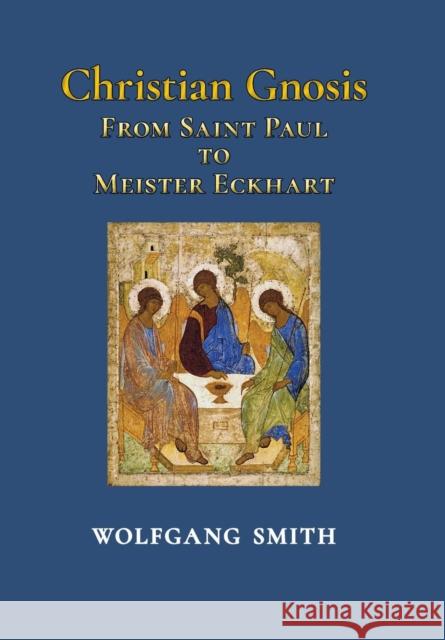Christian Gnosis: From Saint Paul to Meister Eckhart » książka
Christian Gnosis: From Saint Paul to Meister Eckhart
ISBN-13: 9781597310932 / Angielski / Twarda / 2009 / 248 str.
Christian Gnosis: From Saint Paul to Meister Eckhart
ISBN-13: 9781597310932 / Angielski / Twarda / 2009 / 248 str.
(netto: 113,52 VAT: 5%)
Najniższa cena z 30 dni: 118,87
ok. 16-18 dni roboczych
Dostawa w 2026 r.
Darmowa dostawa!
Basing himself principally upon the teachings of Saint Paul and the Clementine Stromata, the author begins the present treatise by distinguishing the idea of gnosis in nascent Christianity from its Gnostic counterfeit. He then considers the implications of authentic gnosis for cosmology, a question that connects intimately with his earlier studies, notably his ground-breaking work regarding the interpretation of quantum theory. The same considerations, however, which invalidate naive cosmology, have bearing on the theological notion of creatio ex nihilo as well; it is this crucial recognition that leads the author to consider alternative formulations within the Judeo-Christian tradition: from Christian Kabbalah to Jacob Boehme and Meister Eckhart. What emerges are the outlines of a Trinitarian nondualism definitive of Christian gnosis.
Wolfgang Smith broaches a vast range of subjects with a mastery that bespeaks an immense culture. --Jean Borella
Here is that rare person who is equally at home with Eckhart and Einstein, Heraclitus and Heisenberg --Harry Oldmeadow
Wolfgang Smith is as important a thinker as our times boast. --Huston Smith
After graduating from Cornell University at age eighteen with majors in physics, mathematics and philosophy, Wolfgang Smith took an M.S. from Purdue, following which he spent three years at Bell Aircraft Corporation as an aerodynamicist. During this period he gained recognition for his pioneering papers on the effect of diffusion fields, which provided a theoretical solution to the so-called re-entry problem for space flight. After receiving a Ph.D. in mathematics from Columbia University, Dr. Smith pursued a professorial career in that field. Soon however his center of interest shifted from the pursuit of science to the critique of scientism and the rediscovery of metaphysics as a theological discipline. He has authored six books and numerous articles, and is today widely recognized as a leading authority in these twin fields."
Basing himself on Christian sources-literally "from Saint Paul to Meister Eckhart"-Wolfgang Smith formulates what he terms an "unexpurgated" account of gnosis, and demonstrates its central place in the perfection of the Christ-centered life. He observes, moreover, that the very conception of a "supreme knowing," as implied by the aforesaid sources, has a decisive bearing upon cosmology, which moreover constitutes the underlying principle upon which his earlier scientific and philosophical work-beginning with his ground-breaking treatise on the interpretation of quantum mechanics-has been based. The "fact of gnosis," however, has a decisive bearing on the theological notion of creatio ex nihilo as well, and it is this imperative that Smith proposes to explore in the present work. What is thus demanded, he contends, is the inherently Kabbalistic notion of a creatio ex Deo et in Deo, not to replace, but to complement the creatio ex nihilo. This leads to an engagement with Christian Kabbalah (Pico de la Mirandola, Johann Reuchlin, and Cardinal Egidio di Viterbo especially) and with Jacob Boehme, culminating in an exegesis of Meister Eckharts doctrine. The author argues, first of all, that Eckhart does not (as many have thought) advocate a "God beyond God" theology: does not, in other words, hold an inherently Sabellian view of the Trinity. Smith maintains that Eckhart has not in fact transgressed a single Trinitarian or Christological dogma; what he does deny implicitly, he shows, is none other than the creatio ex nihilo, which in effect Eckhart replaces with the Kabbalistic creatio ex Deo. In this shift, moreover, Smith perceives the transition from "exoteric" to "esoteric" within the integral domain of Christian doctrine.Wolfgang Smith brings to his writing a rare combination of qualities and experiences, not the least his ability to move freely between the somewhat arcane worlds of science and traditional metaphysics. Alongside Dr. Smiths imposing qualifications in mathematics, physics, and philosophy, we find his hard-earned expertise in Platonism, Christian theology, traditional cosmologies, and Oriental metaphysics. His outlook has been enriched both by his diverse professional experiences in the high-tech world of the aerospace industry and in academia, and by his own researches in the course of his far-reaching intellectual and spiritual journeying. Here is that rare person who is equally at home with Eckhart and Einstein, Heraclitus and Heisenberg! [Harry Oldmeadow, La Trobe University]











